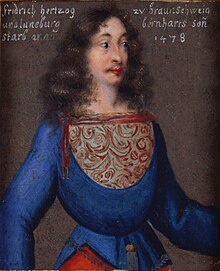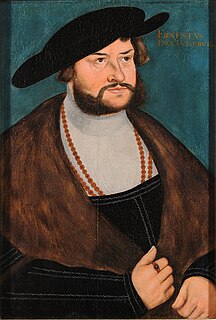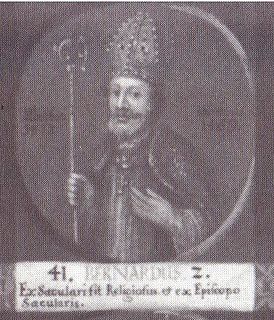| Frederick II, Duke of Brunswick-Lüneburg | |
|---|---|
 | |
| Born | 1418 |
| Died | 19 March 1478 Celle |
| Noble family | House of Guelph |
| Spouse(s) | Magdalene of Brandenburg |
| Father | Bernard I, Duke of Brunswick-Lüneburg |
| Mother | Margaret of Saxony |
Frederick II (German : Friedrich II.), also known as Frederick the Pious (German : der Fromme) (1418–1478) was the Duke of Brunswick-Lüneburg and Prince of Lüneburg from 1434 to 1457 and from 1471 to 1478.

German is a West Germanic language that is mainly spoken in Central Europe. It is the most widely spoken and official or co-official language in Germany, Austria, Switzerland, South Tyrol (Italy), the German-speaking Community of Belgium, and Liechtenstein. It is also one of the three official languages of Luxembourg and a co-official language in the Opole Voivodeship in Poland. The languages which are most similar to German are the other members of the West Germanic language branch: Afrikaans, Dutch, English, the Frisian languages, Low German/Low Saxon, Luxembourgish, and Yiddish. There are also strong similarities in vocabulary with Danish, Norwegian and Swedish, although those belong to the North Germanic group. German is the second most widely spoken Germanic language, after English.

The Duchy of Brunswick-Lüneburg, or more properly the Duchy of Brunswick and Lüneburg, was a historical duchy that existed from the late Middle Ages to the Early Modern era within the Holy Roman Empire. The duchy was located in what is now northwestern Germany. Its name came from the two largest cities in the territory: Brunswick and Lüneburg.
The Principality of Lüneburg was a territorial division of the Duchy of Brunswick-Lüneburg within the Holy Roman Empire, immediately subordinate to the emperor. It existed from 1269 until 1705 and its territory lay within the modern-day state of Lower Saxony in Germany. The principality was named after its first capital, Lüneburg, which was ruled jointly by all Brunswick-Lüneburg lines until 1637. From 1378, the seat of the principality was in Celle. It lost its independence in 1705 when it was annexed by the Electorate of Brunswick-Lüneburg, but retained its vote in the Reichstag as Brunswick-Celle.



















